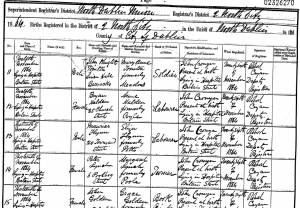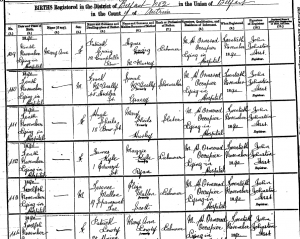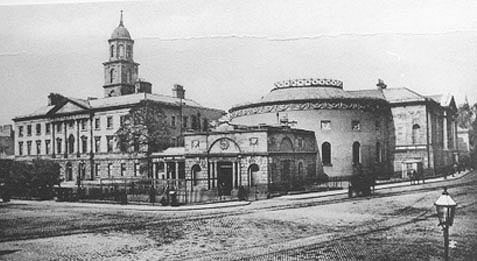No battle-plan survives the first encounter with the enemy. All administrative systems immediately begin to run into exceptions and peculiarities
So it was with the Irish civil registration system. When it came into full existence on April Fool’s Day 1864, the law dictated that births were to be registered within twenty-one days, on pain of a nasty fine. Which meant a prime aim of those registering a birth quickly became the avoidance of the fine. Compare nineteenth-century baptismal registers with the state records and you’ll find many miraculous Irish children baptised weeks or even months before they were officially born.
But the biggest hole in the birth registration system was a feature, not a bug. It was never compulsory to register a child’s forename. This may have allowed quick registration before christening for parents, but the maternity (‘lying-in’) hospitals seized on it. It became a loophole that would allow them to mass-register entire wards full of newborns with no forename. The practice seems to have lasted until around 1910, almost fifty solid years. These are most of the children who appear in the birth indexes with first name “Unknown”.

How many are there? Search the IrishGenealogy birth indexes and you’ll find no fewer that 193,493 births 1864-1919 with no forename. There are significant numbers in every registration district, but the two largest urban areas stand out, with 21,000 no-namers in Belfast and more than 76,000 in Dublin. All the Dublin hospitals used the loophole, but by far the biggest culprit was the “Britain St Lying-In Hospital”, better known as “the Rotunda”, today the busiest maternity hospital in the world. It was busy back then as well, servicing the teeming slums of Dublin’s north city.

Hospitals elsewhere in Ireland also used the loophole, as did midwives, block-registering no-name births at which they were present. And in Protestant-majority areas in the North-East – Armagh, Cookstown, Coleraine, Ballymena, Irvinestown, Dungannon – many more parents than elsewhere registered their children without a first name, perhaps because of some Dissenters’ objections to infant baptism.

The upshot is that there are many many invisible gaps in the birth records, especially in Dublin, but also elsewhere. Search with even more caution and scepticism.
Grenham’s Third Law of Irish Genealogy states “Your ancestor’s birth was registered without a forename.” Don’t even ask about Laws One and Two.
Wow. No wonder searching is so difficult. This and so many other factors.
That was one thing my family actually got right! – well almost. My Dad was registered with one forename and baptised with another a few days later! NO wonder he could never get hold of a copy of his birth certificate!
I have two birth certs for my grandmother–one from Mayo, the other from Dublin–each with a different date. She decided she didn’t like her birth date so she picked out another one that suited her more. Not that it mattered as no one in that generation ever celebrated their birthday. A lot of them in my family had no idea how old they were, or cared. I suspect Nana changed her birth date as part of her campaign to marry my grandfather.
I was lucky enough to live with them, both born in 1876 (or so) until I was seven.
So appreciate your info and delightful/insightful delivery.
This would surely cause some confusion among any ancestor seeking Irish families in a very big way and probably still does
Was it common not to register deaths in the early 20th century?
In my family, every generation used the same first names over and over. Patrick, John, Mary, Margaret are the most common. This occurred in the extended family as well, cousins and uncles had these names too. To sort them out, the birth year and the parents names are the only way to distinguish.
So interesting. Are there any records from the Rotunda before 1864? One of my Irish lines came from North Dublin. Also wondering if, in more relaxed times, earlier records might have contained forenames?
There are indeed. Birth and admission records survive from 1797 and have been microfilmed by the LDS. See https://www.familysearch.org/search/catalog/110706?availability=Family%20History%20Library
Wonderful – thank you so much, John.
That certainly makes it difficult. Combine that with families using the same 3 forenames over the years… still trying to parse out Mary, mother Eliza, her mother Elizabeth Mary… in that same time frame. Census keeps mixing up if patents came from Ireland or England. There is one ‘unknown’ – now I understand why.
Now that I think of it, my own baby bracelet said Baby Sanders since I wasn’t named for several days.
That gives a little more clarity on why my Father was registered in one first name but, appears to have been baptised with another and the original name never used or spoken of again…………..until now?
Do you have any evidence that objection to infant baptism was a reason not to register a name in protestant areas. Leaving aside the anachronistic use of the term ‘dissenter’ I would have thought it was more that there is no urgency about baptism in most protestant denominations so no urgency to choose a name.
Oh John,
Please give us Laws 1 & 2
I think the 2nd law has something to do with the conversion of Russia.
John – Your post contained a wonderful tip allowing me to search for unknown 1st named ancestors. While your link allowed me to search for blank 1st names I’d like to know the search string you entered to achieve that result. I need to learn more about wildcards. Thanks! Colleen
Just put “Unknown” in the forename box